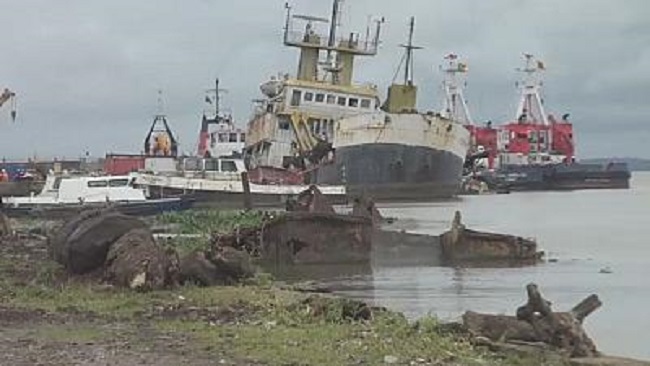Biya regime begins operations to clear boat wrecks off Douala port
The port of Douala, the largest in Central Africa, this week launched an operation to remove wrecks of old boats which hamper its functionality and competitiveness.
“At the operational level, the impacts are even heavier because we are losing docks that should bring us money. It is on the dock that the boat comes to dock to allow exchanges,” said Georges Menye the project manager.
This operation is the first “in 33 years”, according to Cyrus Ngo’o, general manager of the autonomous port of Douala. “The port, the Wouri River is full of a hundred wrecks and we have decided to start with the most dangerous. The first twenty-five wrecks that impede the operation of the port are those that constitute this phase of the project,“ said Mr. Ngo’o.
Fear of pollution
Most of the boats whose frames have been abandoned in the port of Douala are over half a century old and are feared to contain asbestos.
“The majority of these boats are over 50 years old. However, nearly 20 years ago, the construction of boats with asbestos was stopped. Asbestos that has become toxic to humans,” worried Mr. Georges Menye, the project manager.
This contract for the withdrawal of abandoned boats was awarded to an Italian company, Bonifacio, for a sum of 4.7 billion CFA francs (just over 7 million euros).
Work to remove the first 25 wrecks will take eight months.
The main outlet for landlocked Central African countries such as Chad and the Central African Republic, the port of Douala is characterised by its dilapidated infrastructure, congestion, corruption and administrative hassles.
More than 95% of Cameroon’s port traffic passes through Douala.
In February, the French tropical timber trader Rougier designated the “chronic congestion” of the port of Douala as one of the causes of its bankruptcy.
“The bankruptcy of the Rougier group could not be the responsibility of the port of Douala, where the logistics operations of foreign trade are carried out normally”, then reacted Cyrus Ngo’o.
Source: Africa News




